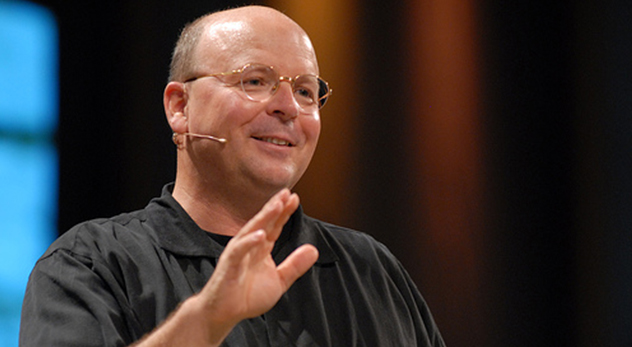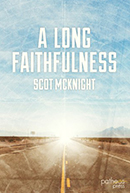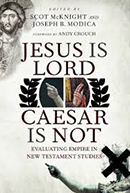
Author and professor Scot McKnight dives headfirst into the contentious Christian debate over salvation and security.
Scot McKnight has never been one to shy away from a debate. In 2010, he challenged Brian McLaren’s “new kind of Christianity” through a fiery Christianity Today article and a debate with McLaren at the Q conference entitled, “Conversations on Being a Heretic.” In 2012, he questioned the way many Christians understand the meaning of the term “gospel” in his book, The King Jesus Gospel: The Original Good News Revisited. He’s also advocated for women in ministry and challenged Christians’ thinking on how to read the Bible. Whether you agree with the positions he has taken, he has proved himself to be a first-rate Bible scholar.
In McKnight’s new e-book, A Long Faithfulness: The Case for Christian Perseverance, the professor and author tackles the controversial topic of “eternal security,” which is the idea that once someone becomes a Christian they can never be lost. Here we discuss his position, the Biblical basis to his view, and why he thinks some Christians have gotten it wrong.
JM: When I first saw this book, I thought it was a general Christian living book on faithfulness. But you’re really wading into a contentious debate in this book, aren’t you?
SM: Yes, the title might lead one to think that, but fairness will also admit the book is a plea to recognize the reality of apostasy and, at the same time, to walk on faithfully behind our Lord. So, it is about faithfulness because it’s about the gravity of unfaithfulness.
You are right, it is a contentious debate. I tell my story in the e-book of how I was reared in eternal security – frankly, for having made the right decision regardless of how I lived – and then in college I was surrounded by some godly and intellectually challenging Calvinists. So I became a reader of high Calvinism, including folks like John Owen, whose volumes I drank in. Somehow I managed not to read Edwards, but my favorite of all was the Baptist Puritan, Charles Spurgeon. I read his autobiography twice and read a sermon a day for two of my years in college.
As a seminary student I was pushed by mentor, Grant Osborne, to think about the other side of this argument because he assigned me to update his Calvinist-Arminian handout. I began by reading I Howard Marshall’s published dissertation, Kept by the Power of God, a book that plods through the Bible on this theme. Over and over I thought his exegesis surpassed and was the more plain reading than what I read in Calvinism. By the time I put that book down I had inwardly surrendered to a Wesleyan form of soteriology. Then when I was a young professor I was asked to teach Hebrews, I spent the summer working the book but especially the warning passages, and I came up with a journal article that is completely reworked and expanded in this piece.
It is contentious, but good Christian theologians ought to be able to sit down with the Bible and sort things out like this. I’ve given my best attempt here; I offer it to the other side to explain the evidence of Hebrews. This ebook does not sort out what all the Calvinist responses might be to each issue for I wanted to present a positive case for what the text says (in my view). If some want to counter my views, fine, but the only thing that interests me is if they can show that the audience is not genuine believers. If they can, I’ll listen but if they want to show how they can explain the text as Calvinists … well, been there and done that. Explanation of something through a grid does not count as proof; what matters is what that text says.
JM: Hebrews 6:4-6 is a much debated passage that you address in this book. How do you think some Christians have misunderstood it?
SM: They have argued that those who were enlightened, those who have tasted the gift, who have shared in the Holy Spirit, who have tasted the goodness of the word of God and the powers of the coming age … that each one of those does not mean what it says but instead something far shorter or far thinner. Take “taste”… when someone says this means “nibble” or only “taste” vs. “eat” they show me they don’t care how biblical metaphors work and that they don’t want that text to mean what it seems to mean: genuine conversion and genuine Christian experience of God’s grace in Christ. And you can’t recrucify Christ if you haven’t died with him already.
I know many disagree with me; I know what they say and I respect that point of view, but I don’t think that is what the Bible says.
JM: How do you interpret 1 John 2:19, which seems to support the notion that those who don’t persevere never expressed true faith?
SM: This is an important text in my overall understanding of apostasy. Some folks walk away because they were never really with us; they never were converted. That’s what 1 John 2:19 says; but there’s no reason to think that text explains every apostasy text in the Bible. But I must admit that most attempts by Arminian types are not to me rigorous enough, and even Howard Marshall’s dissertation and his 1 John commentary do not satisfy careful study of this text (for me).
Two points: the first is that John’s situation ought to be given full consideration; he’s talking in this context about antichrists, and not your ordinary run-of-the-mill Christian who decides to walk from the faith. This is the “last hour” he says in 2:18; the antichrist is coming and, in fact, “even now many antichrists have come” and this indicates the lateness of the hour. This is serious stuff. The “they” is the antichrists and John is talking about a secession or schism in the church so it is at least reasonable, and I think clear, that he’s talking groups here more than personal or individual soteriology (though I don’t want to pretend that personal redemption is not at work here; it is).
The second point is that John clearly connects perseverance, and here it means remaining in fellowship with John’s theology (cf. 2:22-23) and church, to genuine faith. One can reasonably extrapolate from this that anyone who falls away never had genuine faith. I respect that, but in light of the first point it is reasonable to think John has formed a general principle on the basis of a particular situation. It is not convincing to me that he means to speak to all situations with the same principle. In other words, those of Hebrews are in fact described as those who did have genuine faith.
JM: What is it that the church needs to learn from folks who’ve walked away from the faith?
SM: First, that it can happen to us. Those who believe in eternal security, and there are too many who make it glib with a “once saved, always saved” certainty, will not believe this but I do. It is not that this creates anxiety but instead what should be seen as holy reverence and awe before the grace and awesomeness of our zealous God. So those who walk from the faith drive me to God, to God’s grace and to deeper prayer and commitment because they make me see that it is all dependent upon God’s loving grace and sustaining power (onto which we must hold).
Second, that daily life matters, that habits matter, that spiritual practices matter … because those who walk from the faith rarely do because of a sudden realization. Those I know who walked away did so over time, after small decisions and small disobediences that built a character that no longer had humility before God, trust in God’s grace, and tenderness in their love of God. So constant fellowship with others; accountability to others, these matter.
Third, that “assurance” is important but that it is a subjective experience rather than the objective reality. The objective reality is the utter faithfulness of God and the noble accomplishment of Christ at the cross and resurrection. God has done what God can do; God has done all that needs to be done. But we sense that love and that tenderness, that affection for the beauty of our Lord, only as we are sanctified and grow in love and holiness. Assurance, that conviction that we are in Christ, is our appropriation of what God has done.
JM: I see you have edited another new book, Jesus is Lord, Caesar is Not: Evaluating Empire in New Testament Studies. Tell us about it.
SM: For at least a decade biblical studies, especially New Testament studies, has had an echo at work in the halls of the academy: the echo is that if Jesus is the Lord, and if the early Christians declared him to be the one true Lord, then it follows that they were anti-empire, anti-Caesar, and anti-Rome. That is, the echo is if Jesus is Lord then Caesar is not.
Anyone who denies this, of course, is missing the point: there can be only one Lord and one God; if Jesus is that Lord, then no other person or god can be the true Lord and God. Including Caesar. But this inevitable implication of claiming Jesus as Lord is not quite the point being made.
In empire criticism in the New Testament another move occurs: this is a conscious, overt, aggressive theme for the early Christians. They were, in effect, anarchist and rebellious; they overtly repealed the claim of Caesar.
The problem, over all, with this is simple: every time the apostle Paul mentions Rome he is positive. If the apostles truly were anti-empire there is no way Paul can say what he says in Romans 13 – hence the attempts to suggest that Paul is tongue-in-cheek or ironical – and be courageously, aggressively anti-empire.
Joe Modica and I edited this book and, instead of attempting to write the whole ourselves, we selected authors who would give this their all in evaluating the claims of anti-empire scholars. It is fair to say this is the most formidable challenge to empire criticism yet. More could be done, to be sure, but this is a start. We have three openers: Andy Crouch sets this in our cultural context; David Nystrom expertly sketches what Rome thought about imperial power, and it is not unusual to hear make claims about Rome that don’t match the realities of Rome; and Judy Diehl, who has written three long articles in Currents in Biblical Research on this very topic, sketches the history of his scholarship. Then we have one author after another, experts in the field, probe the scholarship and time after time our authors conclude, “Well, perhaps, but it is not all that convincing.” In other words, this volume puts a question mark on this scholarship for overcooking the books.
There’s another issue here: more than one European has said that empire criticism is (1) American scholarship, and no one else cares; (2) anti-Bush era political protest, and we have seen empire criticism diminish under President Obama; and (3) there is an uncanny connection between a person’s politics and one’s posture in the empire critical approach. For years one sees the rather adventurous – for the neutral scholarly game called academic work – “application” of conclusions to contemporary American “empire” on the part of scholars who rarely “apply” anything. In other words, it’s fishy to be an anti-empire critic and be vehemently anti-Bush or anti-America and then to begin seeing it all played out in the pages of the New Testament.
It is entirely reasonable to think Christians ought to criticize empire pretensions on the part of America – it is another to think Jesus and the apostles were engaged in a similar exercise.







